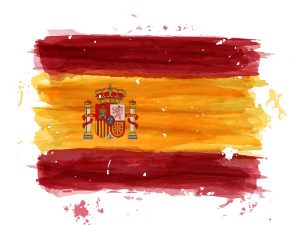Every language has a bunch of words that are more or less untranslatable in English or other languages. In today’s blog post, we have a collection of twenty-five brilliant Spanish, German, Swedish and Finnish words that can not be translated into English.
Often, words and expressions that are untranslatable describe features of local culture, climate or typical national characteristics that might not even exist in other countries. Enjoy!
Untranslatable German words
Wanderlust
= A strong desire to travel and see the world.
Example: Ich habe Wanderlust und möchte schnell irgendwohin reisen!
Fernweh
= Some languages have a word for this feeling, but English does not. Fernweh is longing for some place far away, either a specific location or simply the experience of being away from home.
Example: Immer wenn ich zu Hause bin, habe ich Fernweh.

Weltschmerz
= English speakers might well feel this, but they still haven’t come up with a good translation for it. Weltschmerz is literally ”world pain”: feeling down because of all the things that are wrong in the world and one’s limited capacity to do something about it.
Example: Wenn ich keinen Kummer im eigenen Leben habe, kommt der Weltschmerz.
der innere Schweinehund
= An inner voice tempting you to be passive and lazy. It says the weather is a bit bad, so it’s fine to cancel that plan to go running, isn’t it? And sure there are just two flights of stairs, but why walk when there’s a lift? Conquering your lazy inner voice makes you feel good and accomplished.
Example: Um dein Ziel zu erreichen, musst du deinen inneren Schweinehund überwinden!
der Kummerspeck
= Extra weight gained because of eating to get over a broken heart.
Example: Nach der Trennung hat sie eine Menge Kummerspeck angesetzt.
die Schnapsidee
= A really terrible idea. Ideas like this are usually born as a result of a few schnapps and possibly a bit of additional alcohol, but you can also have a Schnapsidee while perfectly sober. It’s just that these ideas are so bad, you’d think they were thought up by a drunk person.
Example: Das ist ja eine Schnapsidee!

 Untranslatable Spanish words
Untranslatable Spanish words
Sobremesa
= The relaxed sitting around the table, digesting and chatting that takes place after a meal in Spanish culture. Sobremesa is the reason why Spanish waiters often won’t bring the bill before it has been specifically requested.
Example: Estuvimos de sobremesa hasta las seis.
Botellón
= Getting the party started outdoors (because alcohol is cheaper in the store than the bar), generally done by young people. If possble, a botellón takes place at the beach or in ”campo” or the countryside. In big cities, people gather in parks and on the streets.
Example: ¿Te apetece hacer botellón esta noche?

Tener ganas de
= Feel like, want to. The negative version ”no tengo ganas de” can also mean ”I don’t have the energy”. The expression ”tengo ganas de ti” can also be used to mean ”I want you” in the romantic or sexual sense.
Example: Tengo muchas ganas de ver esa película.
Merendar
= Eat a bite of something, grab a snack. Note that the Spanish noun ”merienda” means a snack or a light meal. Merienda is usually had between lunch and dinner.
Example: Todavía no tengo hambre porque acabo de merendar.
Friolero/friolera
= Person who feels the cold easily.
Example: Si eres muy friolero, mejor no mudarte a Finlandia.

Consuegros
= The parents-in-law of your married son or daughter.
Example: Mis consuegros son majísimos, al igual que mi nuera.
 Untranslatable Swedish words
Untranslatable Swedish words
Fika
= Have coffee, take a coffee break. For Swedes, ”fika” means more than drinking some coffee. It’s a social occasion by definition, so technically you can’t ”fika” alone. Besides coffee, you’re also expected to have a cinnamon roll, a sandwich or a piece of cake.
Example: När ska vi fika?
Lagom
= Sweden’s answer to hygge. Freely translated, ”lagom” means moderation and having enough – not too much and not too little.
Example: Vädret är lagom varmt.
Lördagsgodis
= Saturday sweets. Some parents allow their children sweets only once per week, and traditionally this day is Saturday.
Example: Det är lördag idag. Ska vi köpa lite lördagsgodis?

Orka
= This verb is very common in Swedish but doesn’t have an English equivalent. It means roughly ”to have the energy to do something”. Often seen in the negative, ”I don’t have the energy”.
Example: Jag är så trött! Jag orkar inte göra någonting.
Hinna
= Another very common Swedish verb without a good English translation: ”to be there in time (and not be late)”.
Example: Vi har fem minuter på oss. Jag tror inte att vi hinner!
Mysa
= Comfortable lounging around, relaxing. Usually done at home, but it’s not unknown to do this in a café. Fredagsmys is a common Swedish way of spending a Friday evening. This means staying at home and cuddling on the sofa, eating a bit of something good and watching TV. Mysbyxor are comfortable trousers that you change into immediately when you come home from work.
Example: Nu får vi mysa resten av kvällen.

Jobbig
= A very common and useful word that can be used whenever something is a bit annoying, troublesome, difficult, complicated or generally frustrating.
Example: Jag hade en riktigt jobbig dag idag.
 Untranslatable Finnish words
Untranslatable Finnish words
Löyly
= Heat and steam rising from the sauna stove when you throw water on it. When the atmosphere in the sauna is especially pleasant and the temperature and moisture are just right for you, ”hyvät löylyt” is the best kind of praise.
Example: Heitä lisää löylyä!
Sisu
= A combination of stamina, grit, and sometimes sheer stubbornness, this is the famous quality that keeps Finns going after everyone else has given up.
Example: Sisu vie vaikka läpi harmaan kiven.
Kaamos
= Polar night, the time of the year when the sun does not rise at all north of the Arctic Circle. There is a specific term, kaamosmasennus, for depression caused by kaamos.
Example: En kestä tätä kaamosta, haluan matkustaa etelään.

Talkoot
= Finland’s version of barn raising, where the community gets together to get some task done for the common good. Participation is usually voluntary, and compensation consists of something to eat and drink and a feeling of accomplishment.
Example: Tuletko pihatalkoisiin?
Kyykkyviini
= Literally ”squatting wine”, meaning wine that is a bit cheaper than average. You don’t have to squat while drinking it, only while buying it ̶ the term comes from the habit Finnish liquor stores have of putting cheaper wines on the bottom shelf.
Example: Join opiskeluaikana vähän liikaa kyykkyviinejä.
Tosikko
= Person without a sense of humour. Someone who is a tosikko isn’t necessarily annoyed or offended by jokes and pranks, he simply doesn’t find them funny. At all. Of course, a tosikko won’t identify as one ̶ in her view, she is normal and everyone else is laughing for no reason.
Example: Et sinä kuitenkaan naura tälle, koska olet tuollainen tosikko.
A mighty mix of language learning professionals, engineers, designers, user interface developers, gamers and psychologists.







No Comments